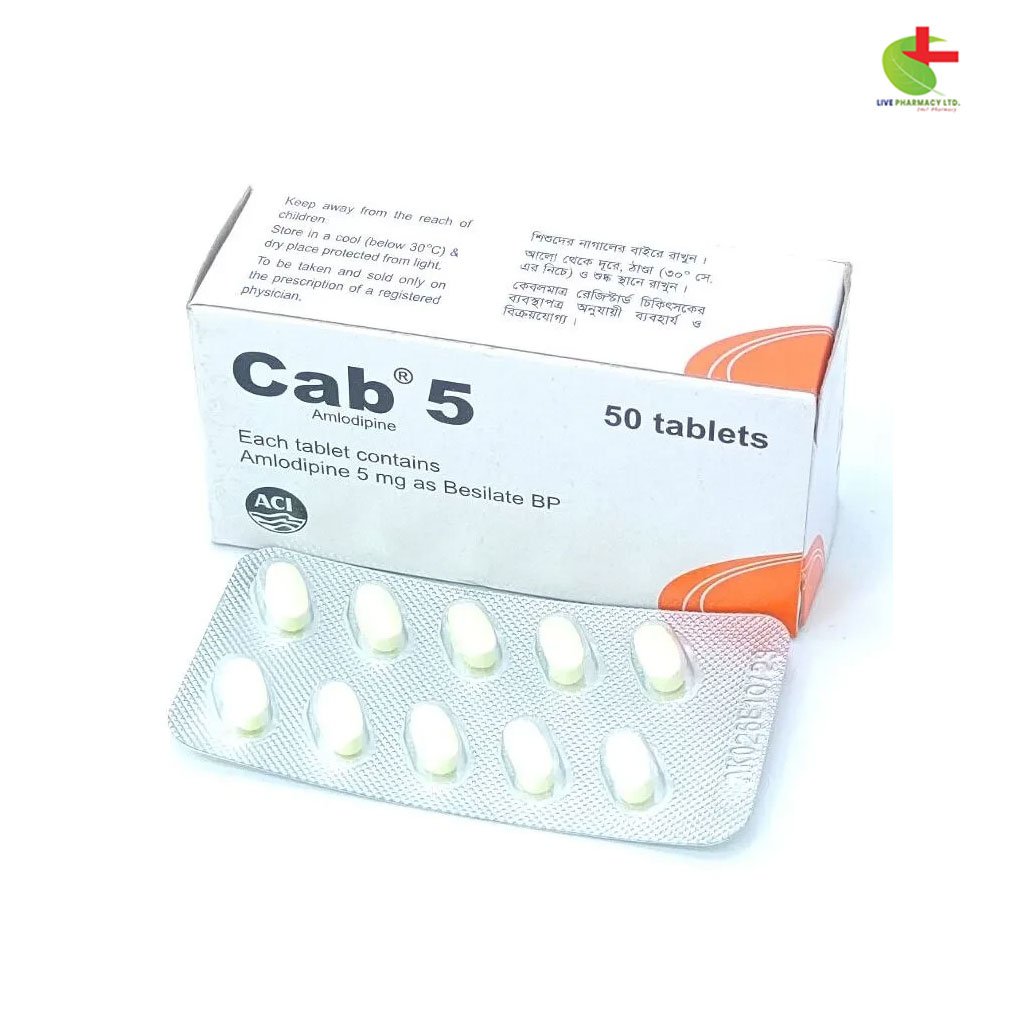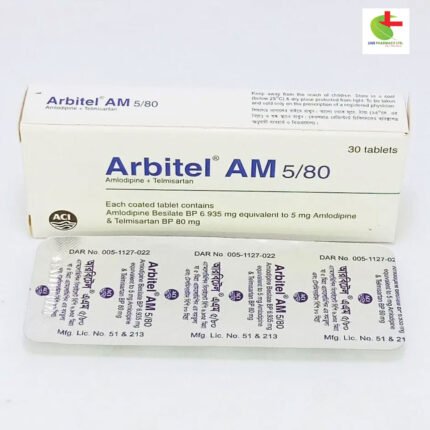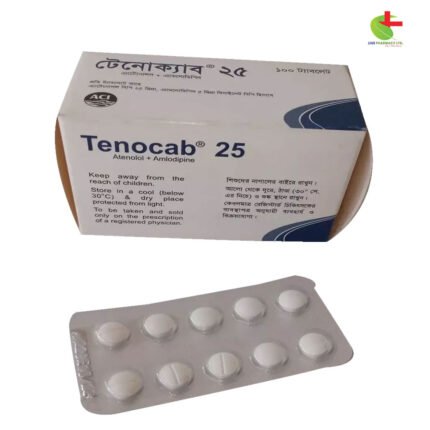Cab 5
50.20৳ Strip(10)
- Cab is an effective treatment for essential hypertension and angina pectoris, available as a monotherapy or in combination with other medications.
- It works by relaxing blood vessels, reducing blood pressure, and improving oxygen supply to the heart.
- Typically dosed once daily, Cab is suitable for both adults and children aged 6 years and older.
- Always follow your doctor’s advice for proper usage and dosage adjustments.
 Brand
Brand
|
ACI Limited |
|---|---|
 Generics
Generics
|
Amlodipine Besilate |
 Type
Type
|
Tablet |
Indications
- Essential Hypertension: Cab is an effective treatment for hypertension and can be used alone or in combination with other antihypertensive medications.
- Angina Pectoris: Indicated for the management of chronic stable angina, Cab works well as a standalone therapy and can be combined with other antianginal agents for enhanced effectiveness.
- Vasospastic Angina: Recommended for the treatment of confirmed or suspected vasospastic angina. Cab can be used independently or alongside other antianginal drugs.
Note: Always follow the guidance of a registered healthcare provider.
Pharmacological Properties
Amlodipine, a dihydropyridine calcium channel blocker, offers a long-acting solution for treating hypertension and angina pectoris. It works by affecting myocardial cells, vascular smooth muscle, and specialized cells in the heart’s conducting system. Amlodipine primarily causes vasodilation, resulting in reduced peripheral resistance, lower blood pressure, and a decrease in afterload. This promotes improved coronary blood flow and increases cardiac output, thereby enhancing myocardial oxygen supply.
Dosage & Administration
- For Hypertension: The standard dose is 5 mg taken once daily, with a maximum dosage of 10 mg per day. For elderly patients or those with hepatic insufficiency, a starting dose of 2.5 mg is recommended, which may be gradually increased.
- For Angina (Chronic Stable or Vasospastic): Typically 5 to 10 mg daily, with lower doses recommended for the elderly and those with hepatic insufficiency. Most patients will require 10 mg.
Administration Instructions: Cab can be taken at any time of day, with or without food.
Always consult with a registered doctor before taking this medication.
Drug Interactions
- Potentially Hazardous Interactions: Caution is advised when combining Cab with beta-blockers, particularly in patients with severely impaired left ventricular function.
- Other Notable Interactions:
- Digoxin: No significant interaction has been observed.
- Cimetidine: No interaction reported in clinical studies.
- Warfarin: Cab does not significantly affect warfarin’s prothrombin time.
- Food: The absorption rate of Cab is unaffected by food.
Contraindications
- Known hypersensitivity to dihydropyridine derivatives.
- Not recommended during pregnancy.
Side Effects
Common side effects of Amlodipine include dizziness, flushing, headache, low blood pressure, and peripheral edema due to its vasodilatory effects. Additional side effects may include gastrointestinal issues, increased urination, lethargy, eye pain, and mental health concerns like depression. Some patients may experience an initial worsening of angina symptoms or excessive drops in blood pressure leading to temporary blindness or ischemic events. Allergic reactions may also cause rashes, fever, and liver function abnormalities.
Pregnancy & Lactation
- Pregnancy Category C: No conclusive studies have been conducted on Amlodipine’s use during pregnancy. It should only be prescribed if the potential benefits outweigh the risks to the fetus.
- It is unknown if Amlodipine passes into breast milk. It is advisable to discontinue breastfeeding while taking this medication.
Precautions & Warnings
- Use with caution in patients with liver dysfunction, and those who are pregnant or breastfeeding.
Use in Special Populations
- Children (6 to 17 years): Start with 2.5 mg daily, adjusting to 5 mg if necessary. Doses higher than 5 mg have not been studied in this age group.
- Children under 6 years: The effect of Amlodipine on blood pressure in children younger than 6 is not established.
- Elderly: The medication is generally well-tolerated in older adults. Normal dosing is recommended but should be carefully adjusted as needed.
- Renal Impairment: Amlodipine plasma levels do not correlate with the degree of renal impairment, so the regular dosage can be followed. Amlodipine is not dialyzed.
- Hepatic Impairment: Start with a low dose (2.5 mg) and increase cautiously, as the medication’s effects in those with severe liver impairment are not well-studied.
Overdose Symptoms & Management
- Symptoms: Overdose may result in severe vasodilation, hypotension, and reflex tachycardia. Severe cases may lead to shock or death.
- Management: Treatment focuses on stabilizing blood pressure through cardiovascular support, including monitoring heart and respiratory function. Intravenous calcium gluconate may help reverse calcium channel blockade. Gastric lavage and activated charcoal can reduce Amlodipine absorption if administered soon after ingestion. Since the drug is highly protein-bound, dialysis is unlikely to be effective.
Therapeutic Class
- Calcium Channel Blockers
Storage Instructions
Keep out of reach of children. Store in a cool, dry place, away from light.













Reviews
There are no reviews yet.